|
Tower of Babel, cat tower, same thing, right? Photo by Kate Ota 2023 The Power of Babel: A Natural History of Language by John McWhorter was published in the very early 2000s and discusses how languages arise, evolve, split, and go extinct. Why am I writing this as an "Is It Worth It" and not a book review? Well, I realized early in the book that if I was going to create a fantasy or scifi language, this book included a lot of information about how to make a fake language feel real and not just some made up words in an English grammar scheme.
Overview This book covers a lot of ground in 303 pages, including discussing different grammatical boxes in which languages can be categorized and how languages tend to morph words (because there are reliable patterns). A lot of space is also dedicated to discussing dialects and creole languages. My Experience I enjoyed many of the interesting facts in the book, and learned so much about language in general that I'd never considered. In fact, one of the facts I read was tweeted by Merriam Webster while I was reading. What are the odds? However, it was a little dry and spent a long time explaining things. There were also a lot of Bill Clinton jokes. Is It Worth It? I got this paperback book from an indie bookstore for $17.99. If I was trying to build a language for a story, I think it would be a huge resource to get started with the basic concepts of how the language would operate. However, if you're just a linguistics nerd, or someone who got excited by the etymology in R.F. Kuang's Babel, then this is probably not the book you are hoping it is. Have you ever tried to create a language for a project? What sources did you find helpful? Let's discuss in the comments!
0 Comments
The cover is so interesting to me, with the expression on her face and the northern lights in the background. Camp Zero is Michelle Min Sterling's debut novel. It's a near-future cli-fi (science fiction with emphasis on climate change) with three main POVs. It's been out since the end of March, and already I've gotten so many emails from Amazon advertising it with other books.
Arguably the main POV of Camp Zero is Rose, a biracial (white/Korean) sex worker with a secret agenda who arrives at a worksite in northern Canada where a famous architect is building a new city. The second POV is Grant, an English professor/heir to billions who wants to escape his family's influence. He comes to the worksite thinking he'll be an English prof at the new college there, only to realize it's not built yet, so he tutors the construction workers. The third POV is a collective (we/us) perspective about an all-female scientific crew (includes LGBTQIA+ characters) at an even farther north research station. They've signed on for two years of isolation to study the climate, but they get a lot more than they bargained for and band ever closer together to survive. This book was different from what I've been reading, which kept me interested. The cli-fi aspect was fresh, since a lot of cli-fi focuses on the more southern parts of the world, but this focused on what would happen in Canada. Some really cool concepts like the Floating City were done well, with not just the rich and wealthy in mind, but with a clear demonstration/criticism of how anyone but the top 1% would be treated in this scenario. I'm not a huge fan of sex worker characters, since in books they're almost always sexually assaulted (or an attempt is made) and that's not a scenario I enjoy reading. This book was not an exception to that. I also struggled with the collective POV, even though the idea of their predicament and the types of characters were my favorites (shout out to badass lady scientists.) I think the collective POV kept me from connecting as well with these characters, so they always felt at arm's length (aka a very distant POV.) I also didn't find the ending very satisfying. This book is for you if you are looking for cli-fi, want a biracial (white/Korean) POV, want a sex worker character who chose and feels empowered (in most scenarios) by her job, or are interested in trying a collective POV. This book is not for you if you are looking for deep POVs or are not in the mental space to read about sexual assault, the death of a partner, or a sex worker (regardless of if she chose it.) Have you read Camp Zero? How did you feel about the collective POV? What did you think about the ending? Let's discuss in the comments! I know this cover makes you think there's a kraken attack in this story. There is not a kraken, it's much more unique. The Adventures of Amina Al-Sirafi by Shannon Chakraborty is an adult historical fantasy novel centered on an 12th century female pirate captain and her crew in the waters off of Yemen. This book is in the same universe at the author's famous Daevabad Trilogy (City of Brass (2017), Kingdom of Copper (2019), and Empire of Gold (2020), written as S.A. Chakraborty) although about one thousand years before those books take place. This author also has separate short stories and a collection of short stories set in the Daevabad universe.
Amina Al-Sirafi is a retired pirate captain, living out her days with her daughter and mother in an unassuming corner of Yemen. However, when a wealthy woman arrives knowing a little too much about Amina, the captain is forcibly pulled from retirement to find the wealthy woman's missing granddaughter. Success means riches beyond any of her former plunder, but failure means her daughter will be killed. Amina reunites with her old crew of misfits and her all important ship to sail the seas once more, but finds far more adventure than anyone bargained for. There's a lot to like about this novel. Amina is an interesting character, a mother--which fantasy often kills off--and an older character than most fantasies focus on. The rest of her crew is entertaining as well. I hadn't seen most of the magical things they encountered before, which kept things feeling fresh and new. Despite it being a long book, it didn't take that long for me to read. On the downside, the "one last adventure" trope was at the forefront, which isn't my favorite. It also felt like the beginning (after Amina gets her goal for the novel) was quite slow, and a lot of it was figuring out what was going on. I'd say from the 20% to the 45% mark was too slow for my taste. This book is for you if you enjoyed the Daevabad Trilogy, because I have to assume there are easter eggs in there for you. (I didn't read her other trilogy so I don't know for sure.) It's also or you if you enjoyed the maternal main character of The Broken Earth Trilogy by N.K. Jemisin or if you're looking for fantasy with Islamic influence. It's not for you if you dislike the "one last adventure" trope, dislike pirates, or need the pacing to be quick throughout. It's also not for you if you're going to complain about Muslim characters. Have you read The Adventures of Amina Al-Sirafi? Have you read City of Brass and know how they relate? Let's discuss in the comments! The two books in the Six of Crows Duology. The Six of Crows Duology by Leigh Bardugo is a pair of books set in the same universe as Shadow and Bone, called the Grishaverse. Grisha are magic users and fall into certain categories, mainly people who can manipulate elements (wind, water, fire), people who can manipulate human bodies (healers or heartrenders), and people who can manipulate objects (called Fabrikators). That's all explored in the Shadow and Bone trilogy, which largely takes place in Ravka. Six of Crows focuses on six characters in another country nearby called Kerch. Characters from Six of Crows appear in the Netflix adaptation of Shadow and Bone, but don't let their appearances there fool you, this duology has nothing in common with season 1 and very little in common with season 2. This duology came out a while ago (2015 for Six of Crows and 2016 for Crooked Kingdom) but are still often on agent MSWLs and have some elements in common with my WIP, so I decided to take a look.
As a side note: You do not need to read the Shadow and Bone trilogy first, although events in that trilogy are alluded to and even spoiled in the duology. If you plan to read both series, read Shadow and Bone first. The duology's main characters are Kaz Brekker, the ruthless leader/strategist of group; Inej, a skilled climber/tight rope walker/acrobat/assassin; Jesper, the sharpshooter; Wylan, the runaway rich boy and explosives expert; Nina, a Grisha heartrender; and Mattias, a former Grisha-hunter and Nina's sort-of romantic buddy. The main plot is a heist--they need to break into the castle of another country (Fjerda, where Mattias is from) to steal a chemist who is making a drug that makes Grisha more powerful and then pretty much kills them. For their troubles, they're promised a wild amount of money. They must deal with constant changes in plans and their own pasts bubbling up to haunt them. There's a lot to like in this duology. The characters are great, the heist is well done with some Ocean's 11 vibes, and the pacing is excellent (which it needs to be for books this long.) I liked the depth of the characters, which I was surprised by because with six POVs, there's a high risk of some characters coming off as flat. However, I knew what motivated each person very clearly. I even took notes so I can try some of Bardugo's techniques in my own writing. I will admit that I have read some of Bardugo's other work and disliked it, so I was surprised I liked this so much. If you're in the same boat as me, don't be afraid to try this duology. No book is perfect, of course. One thing that fell a little flat for me was that Kerch/Ketterdam were clearly based on the Netherlands/Amsterdam, but while I got that sense linguistically (one of Bardugo's strengths is using the names of things to give a really cohesive sense of place) I didn't get that sense in other cultural elements. As a person with Dutch heritage, I wanted more Dutch! On another picky note, so many of the characters made quick witted comments and jibes that their dialog often felt interchangeable during big group scenes. This duology is for you if you liked Shadow and Bone (the trilogy or the Netflix adaptation), enjoy heists, and enjoy ensemble casts. It's not for you if you dislike multi-POV books, if you are not in the right headspace to read about kidnappings/sexual assault/human trafficking, or if you're hoping to find a very Dutch Dutch-inspired setting. Have you read the Six of Crows Duology? Which crow is your favorite? Let's discuss in the comments! |
Archives
April 2024
Categories
All
|

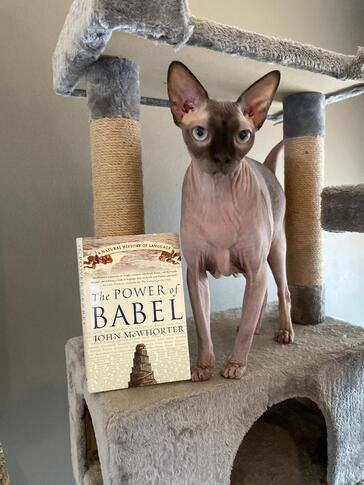
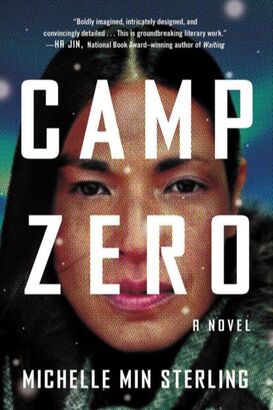
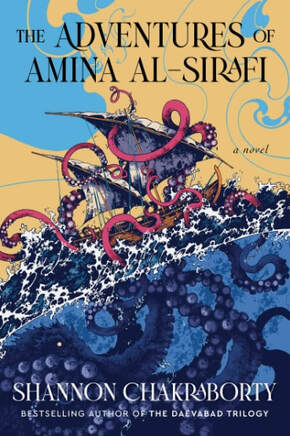
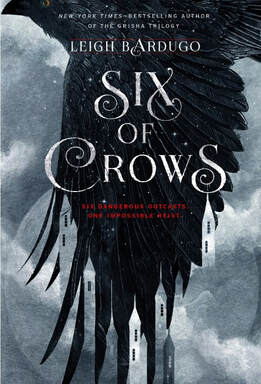
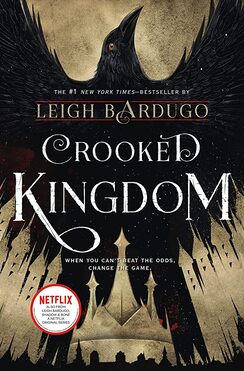
 RSS Feed
RSS Feed